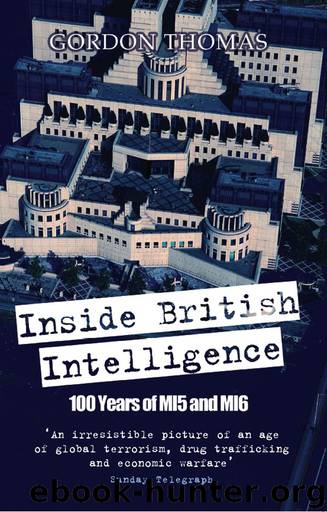Inside British Intelligence by Gordon Thomas

Author:Gordon Thomas [Thomas, Gordon]
Language: eng
Format: epub
ISBN: 9781907532658
Publisher: Aurum Press
LONG BEFORE THE DISCOVERY OF AMES’S TREACHERY, the possibility of another mole had led to the closure of both the Moscow and East Berlin stations to protect the remnants of the CIA’s once powerful network of double agents behind the Iron Curtain. For William Casey, their loss added to his fear that his tenure as director (1981–87) was already blighted.
Physically Casey was a shambling figure with a jowly face, permanently red-rimmed eyes as if he never slept enough, and a voice usually a little more than a mumble, but from his slack mouth came shrewd judgments. After his retirement, he gave a series of interviews (some to Bob Woodward of the Washington Post, others to the author). In them he characterized Ronald Reagan as “a man before his time with big visions.” President Gerald Ford was “the wrong man at the wrong time.” William Webster, the FBI director, had “swallowed a law library and whenever I proposed anything not quite in the book, he’d almost choke on it.” Nahum Admoni (head of the Mossad, 1982–89) was “a Jew who’d want to win a pissing contest on a rainy night in Gdansk.” Alexander Haig, secretary of state, was “an opportunist who knew how to rule by division.” British intelligence was full of “people who knew how to bend the rules, usually to their benefit.”
Bill Buckley, who became Casey’s close friend, believed there was no better man to lead the CIA. “He had the classic can-do mentality which was once the trademark of the agency until disillusionment set in.”
The possibility of another mole within the agency had helped create the sense of failure in Casey as the KGB continued to roll up CIA operations.
Following his transfer on Reagan’s order from directing the National Security Agency to serving as Casey’s deputy, Admiral Bobby Inman saw Casey as, “little more than a buccaneer.” On their first meeting Casey had mumbled, “I want more can-do, less can’t say.” Officers who had served on the dark side in the Directorate of Operations were pitched into retirement. Careers were suddenly ending, not because of suspected treason, but for what Casey saw as a lack of zeal. On October 14, 1985, Casey addressed a closed meeting of those who remained in the directorate, “The Soviet Union has already trained about six hundred people in terror and paramilitary methods. A Soviet connection may seem very shadowy to some, but it seems very close to me. The terrorists are now in Cuba and Nicaragua and I need to know who sent them. Then we cut the threat off at source.” He made it clear he needed new blood to do this, people who were ready to do what he wanted.
Casey’s demand, following the CIA’s failure to have correctly assessed Ames psychologically, would lead to another disaster for the agency.
Edward Lee Howard had joined the CIA in 1981 around the same time as Casey. International terrorism had begun its work of destruction, which would eventually zero in on the United States,
Download
This site does not store any files on its server. We only index and link to content provided by other sites. Please contact the content providers to delete copyright contents if any and email us, we'll remove relevant links or contents immediately.
| Africa | Americas |
| Arctic & Antarctica | Asia |
| Australia & Oceania | Europe |
| Middle East | Russia |
| United States | World |
| Ancient Civilizations | Military |
| Historical Study & Educational Resources |
Life of Elizabeth I by Alison Weir(2071)
The Invisible Wall by Harry Bernstein(1799)
Art of Betrayal by Gordon Corera(1428)
1916 in 1966 by Mary E. Daly(1278)
Thunderstruck by Erik Larson(1258)
The Decline and Fall of the British Empire, 1781-1997 by Piers Brendon(1123)
A Brief History of Britain, 1066-1485 by Nicholas Vincent(1028)
A Brief History of Britain, 1485-1660 by Ronald Hutton(1004)
Guy Burgess by Stewart Purvis(1003)
Mary, Queen of Scots by Weir Alison(984)
Henry VIII by Alison Weir(937)
The Last Lion 02 - Winston Churchill - Alone, 1932-1940 by William Manchester(927)
Fifty Years On by Malachi O'Doherty(904)
Lang Lang by Lang Lang(875)
1066 by Andrew Bridgeford(859)
Gimson's Kings and Queens by Andrew Gimson(853)
Coalition by David Laws(840)
The Last Plantagenet by Thomas B Costain(835)
London: A Biography by Peter Ackroyd(829)
